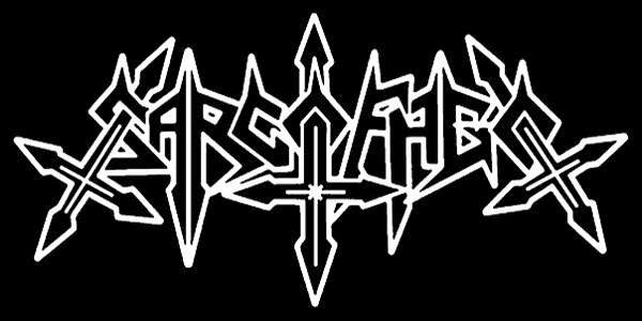
The following interview is done with famed drummer Manu “Joker” Henriques, of Sarcofago (1988-91) fame, also playing in Angel Butcher (1987-2006) and Uganga (1993-present). This interview was originally done for the 'zine Garm/Cry of the Wolf (Germany).
*Special thanks to the editor W. Wolf
Circa 2015
SARCOFAGO, VULCANO, SEPULTURA, DORSAL ATLANTICA, SEXTRASH, NECROFAGO, OVERDOSE, MUTILATOR, HOLOCAUSTO, MYSTIFIER, CHAKAL, ATTOMICA, AMEN CORNER, WITCHHAMMER, GENOCIDIO, AAMONHAMMER, IMPURITY, HEADHUNTER D.C., LUSTFUL, SLAVERY, EXPULSER, CALVARY DEATH, ANGRA, CIRRHOSIS, LEVIAETHAN, RATOS DE PORAO, EMBALMED SOULS, EXTERMINATOR, KRISIUN, LULLABY, THE MIST, MASSACRE, VALHALLA, P.U.S., SANCTIFIER, etc. …
I know that’s just a few bands from Brazil, but it's what I can remember at the moment and we all know there are a lot more from that “exotic” country … Like I wrote in the previous split-interview with the other four musicians from Brazil, the Brazilian Metal-scene was and still is always something special for me.
Here I have the honor of another split interview, lets say its way more classical, because all of the musicians began in the Metal-scene over 25 years ago.
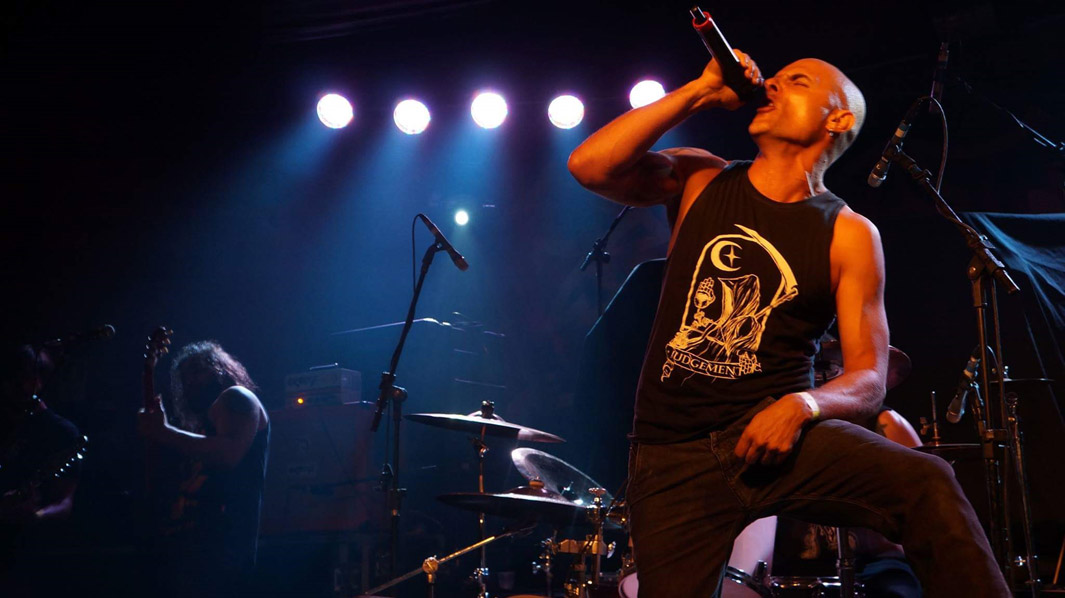
1. First, thanks a lot for your interest and still believing in printed magazines/fanzines and for keeping the old classic flame still burning through the technical revolution!
Well, I don’t think I have to ask anymore about yourselves and who you are and the typical questions about your musical activities, so I will try to keep the conversation more about the past, present and future of the Brazilian Metal scene, the different economic and political situations, and more…
Alright, let’s begin the first question about your discovery of Metal music. When did you discover Metal music personally and can you remember how the feeling was at that moment?
Manu “Joker”Henriques: I started listening to rock as a child. My first band was Bleatles and since this day I'm still a big fan of the Fab Four. In 81-82 I discovered Survivor with the song "Eye of the Tiger" and from then on I really became interested in rock. Regarding heavy metal the first bands are Black Sabbath, Kiss and AC/DC. This was around 1982 and since then I am a metalhead with great pride.
1.1. Before I discovered Metal music back in 1993 with IRON MAIDEN´s “A Real Dead One” I listened to some Rock acts like QUEEN and a few other bands like that for example.
About my first experience with Metal music I can say it was a very special moment at that time, first the front artwork and of course the music itself, which of course I didn’t understand anything at that time of what they were singing and writing about, but it was fascinating of course.
How did you go from Rock to Metal and then to extreme Metal music and then getting your first instrument?
Manu : As I said I started listening to classic rock and then the pillars of the heavy metal scene. In the mid 80s I was connecting to heavier styles and discovered bands like Motorhead (masters!), Venom, Hellhammer, and all the thrash scene and crossover/punk/hardcore bands. My basic influences are these and from 1986 I created my first band, Angel Butcher, with some friends.
1.2. I read in older interviews from other musicians/bands that they had to steal to get instruments, because they didn't have the money in that time. So how hard was it for you to get an instrument?
Manu: In my case luckily I have never needed to steal. I bought my first drums (third hand used) in '86. Part of the money I got pasting political posters in the streets, but most of the stuff I threw in the trash (laughs). My parents helped a bit as well and so I stepped into the world of music without becoming a thief (more laughter). At most I was a small delinquent offender.
2. Since the 80s/90s a lot has happened -in and outside the Metal scene- and we could fill a lot of books with it. Please tell me from your sight and your experiences how the past was!
Especially in the 80s since the political situation was different than today, I can imagine it was not easy to play Heavy Metal music or be in an extreme Metal band in Brazil.
How difficult was it to form and to be a member of a Metal band back in the 80s/beginning of the 90s?
For example, I read about that having long hair was kind of forbidden, like it was hard to find work, etc…
Manu: The long hair thing was more serious during the military dictatorship in the years of the 60s and 70s. In the early 80s things were a little calmer, but the police were always hard with metalheads, punks etc ... I had some difficult moments with the police in the 80s (laughs). Fuck the corrupt police of Brazil! And fuck the motherfuckin' politicians that govern this country!
2.1. About the political situation in Brazil, from the 1960s until 1985 it was under military dictatorship and has now been for 30 years a democratic government and since 2011 been under president Dilma Rousseff.
Can you tell me how hard the political situation was under the dictatorship?
Manu: Man I was born during the dictatorship and I remember as a child seeing the army in the streets and people being afraid. I think it was a dark period in Brazilian history, but the democratic government we have today is also shit. We had the chance to have a good transition from dictatorship to democracy when Tancredo Neves was elected president, but I believe this was not what the corrupt did, and he was murdered, as well as other politicians here as JK, Jango and Ulysses Guimarães. Brazil is a no man's land.
2.2. How much of the political and economic situation has changed since the 80s and 90s until today?
Manu: In some situations it has changed a lot . Today the lower class of people can for example take a plane trip (something unthinkable in the years 70/80) or buy a house. In other places there remains the same shit, we are ruled by corrupt thieves who deceive and manipulate the masses for their own benefit .
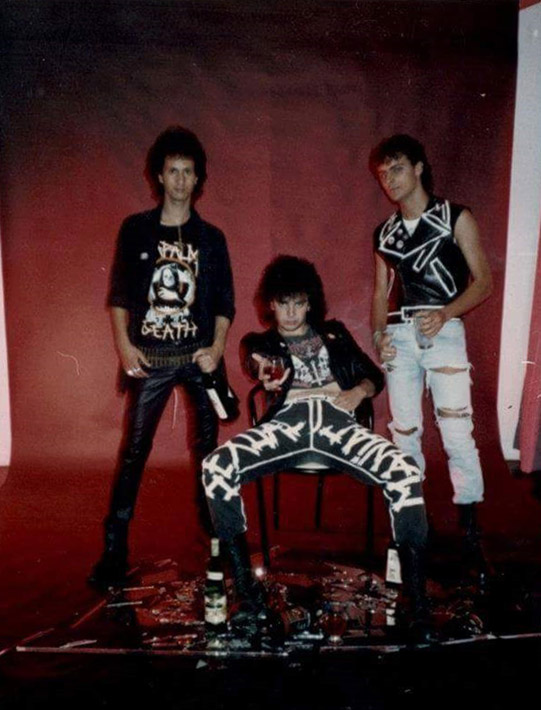
[Sarcofago - 'Rotting' era - 1989 - Manu is on the right]
2.3. Well, in 2014, Brazil had the football World Cup. It’s not just about the sport now, but also the economic and political side. Of course in every sport nowadays when it comes to a lot of money there exists a lot of political influences. So what brought this world-cup to your country?
Because history shows us that when any major sporting events or Olympics are over, the over-built and newly built places and stadiums are empty or only half full for later sporting events. How does the situation look like today in Brazil?
Manu: I like football but did not go to any cup match because I think that was not the right time for it here in Brazil. I can not see with good eyes this event taking place here in 2014 at a time of political crises and scandals such as Petrobras. It seems something to distract the masses as well as the fucking carnival. They built many things? Yes. But in my opinion our country needs investments in other areas. We are unable to deal with something like the world cup. If we had won, the illusion would be greater.
3. In Brazil there exists a few different ethnic groups of various origins… We all know about the Portuguese - the original colonists there in Brazil, about the Africans… and about the colonization ca. 1800s, but a big part of it also comes from the half century of 1900 mostly by Germans, Italians, Poles, French, and Spaniards, who brought and created a piece of Europe mostly in the south part of Brazil. A big part, for example, by the Germans are in the areas of Paraná, Santa Catarina and Rio Grande do Sul, where almost 40% of the people are of German origin.
What can you say about the different ethnic origins and about the traditional people and communities? Are there still a lot of decisive differences between the cultures and ethnicities?
Manu: Definitely yes. I believe that here in Brazil we have an easy 4 or 5 countries. If you go to the Amazon and then to Rio Grande do Sul it is brutally clear. We also had our holocaust, but here instead of Jews black people and Indians died. Brazil is a mixed nation built on blood and exploitation. I live in Minas Gerais in the southeast region of the country and here this ethnic mix is very clear. I am an example of this because my father's family came from Europe (Portugal and Spain) and my mom has black and Indian blood mixed with Portuguese .
3.1. We all have our ethnic backgrounds and historic backgrounds of our families… are you proud of your ethnic origin and where your ancestors came from?
Manu: Surely bro . I am what I am. A son of Latin America.
4. Not all bands used English in their lyrics and many used the Portuguese mother tongue, like VULCANO, in the beginning, for example… English is a foreign language in your country and was and still is not very well established in schools etc., as it is in many European countries, correct?
Can you remember your first song you created?
Manu: I started writing in English with my first band Angel Butcher, after Odd Mellody and Nuts. When I formed Uganga in 1993, a band that I am today the singer, I decided to sing in Portuguese and since then it's my way to express myself. I think you can go any one of these paths, but it needs to have content and truth in writing. With Uganga I've done 2 tours in Europe and at no time was our language a problem. Just as it is not for anyone who sings in German, Swedish or any other language besides English. Cool you talk about Vulcano (who has sung in both languages??). This band kicks ass and are great friends! We recorded a version of "Who Are The True?" in the new Uganga album (Opressor - 2014).
On this track we had the participation of Murillo Leite (Genocídio) and Ralph Klein from the great Macbeth (Germany).
4.1. Bands from South America used to have a harder time gaining recognition on the international market in the past, compared to bands from North America or Europe for example, do you agree and what were the reasons for that?
Manu: Yes . In the 80s we had less information, less access to decent equipment and studios... I believe that nowadays things are more equivalent to the rest of the world. We have several bands that can be placed side by side with big names from Europe or USA. But it sure has a lot of shit too (laughs). Both here and there.
4.2. Brazil had in the middle/end of the 80s/beginning of the 90s a good Black/Death Metal scene, with a few good bands who became cult-bands nowadays. However from the middle of the 90s to the beginning of 2000 there wasn't much activity. Why had so many bands changed or stopped their activities?
Manu: I think every style when you have a large exhibition attracts many people and then the number of bands increases. In Brazil in the mid-80s it was so. The same occurred in the Bay Area and Norway to name two examples. When “the fire goes down” many people drop out. In my case I still am playing in bands since I was 14 years old. I don’t give a damn about hypes or trends.
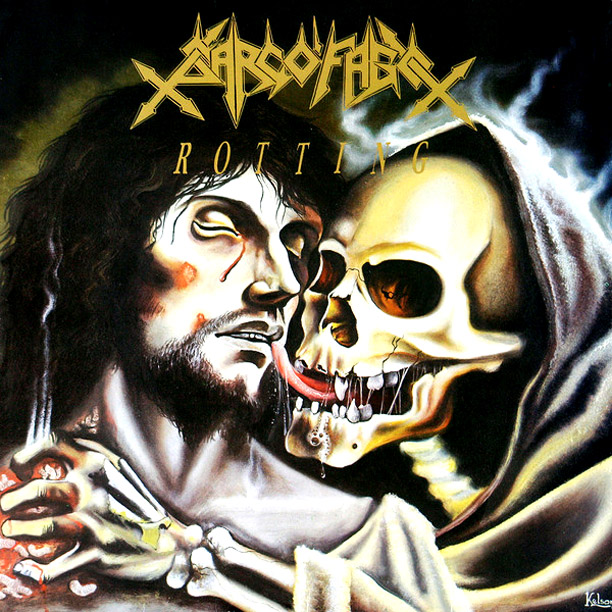
[Sarcofago - 'Rotting' EP - 1989]
5. Areas like Belo Horizonte/Minas Gerais and Salvador/Bahia were well known for some extreme Metal bands. Please tell me about your area and how much Metal music originated there?
How did it feel to attend those first concerts, the tape-trading with each other and being in contact back then with other local bands?
Manu: The rock scene here in Minas Gerais in the 80s was something incredible. Sold out shows, excellent bands in all corners of the state (not only Belo Horizonte) and a sense of togetherness which nowadays is rare. Today there are many good bands but the scene as a whole is more disunited. This ends up being harmful to everyone, but I try to do my job and move on. All are cycles, things come and go…
5.1. The wheel of time didn’t stop in the Metal scene and every day new Metal and extreme Metal bands come along worldwide. Every month, a whole lot of albums are being released, so many that you can’t even keep track anymore. So how much do you follow the local Metal scene there, and how interested are you still in it?
Which albums from new bands have you especially liked in the last five years and which can you recommend?
Manu: I keep thinking the same way. Today, as in the 80s, it has lots of cool stuff and a lot of shit too .
I can mention some great bands like John In Arms, Seu Juvenal, Scourge, Project Black Pantera, Wolfbreath... It is also nice to see the old school producing. Holocaust, Witch Hammer, Angel Butcher, among many others remain relevant.
6. Now we come to Cogumelo Rec. who formed back in 1980 and have existed now for 35 years. Over time, more and more musicians and bands have said negative things about Cogumelo, whether it is money being embezzled or that contracts were breached, several musicians and bands have nothing good to say about the label. But one thing we should not forget, they released a few great albums like the cult album I.N.R.I. of SARCOFAGO, or the first AMEN CORNER and IMPURITY releases and several others.
So what can you say about that label from Belo Horizonte and what are your experiences with them?
Manu: I never lived in Belo Horizonte. I am a native of Triangulo Mineiro and so my point of view could be a little different. I think Cogumelo had a very great importance to the strengthening of the Brazilian metal scene and as I worked with them (during the 'Rotting' days) they were good with me. I have no friendship or closeness with this label but respect its legacy .
6.1. Labels come and go, like bands, trends, etc. … but Cogumelo still exists, and is the longest active record label in Brazil, and also the first one who began publishing extreme music and albums.
Do you know why Cogumelo has survived for such a long time now?
Manu: I could not tell you. I believe they have made a lot of money with Sepultura and Sarcófago. I do not see other groups that may have been profitable without these two bands and then some pop things released in the 90s as Pato Fu or Tianastácia. I think these bands and a little perseverance made the difference. But it's only my opinion (laughs).
7. We are all growing up and people and bands have the internet to discover new music and information, classic or new albums, etc. … all with just a few clicks and we have the technology to send and spread our messages in a fast, cheap and easy way. Back in the past we had to write letters, phone calls, or meeting each other in person (which was almost impossible for people overseas, who had only the first two possibilities for contact).
Do you miss the old days?
Manu: I try to adapt to situations. Surely I am not a nostalgic guy... I think this is because I never walked away from the underground scene, I never abandoned the road. I have always been playing in bands, sending and receiving materials, going to shows etc... This often happens to people who leave the metal scene, get fat, get bad tempered, leave the look and forget the past for a while. These people tend to become nostalgic with time. I never left the road, either by letter, email or smoke signals, I'm always on the road. I was a hardcorebanger in the 80s and am still nowadays.
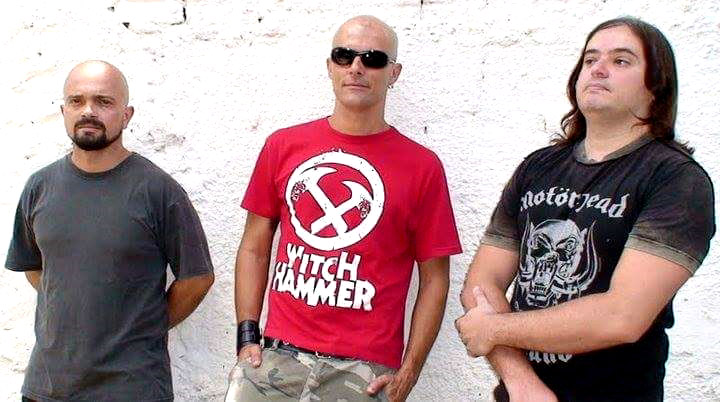
[Manu is seen here in the middle]
7.1. Like I wrote before, record labels come and go, like everything else… what do you think about Metal and business? In general, the music industry has changed, let’s say, in the last ten years.
The revolution of the internet didn’t spare the Metal “Underground” and Metal music, and the World Wide Web with its many possibilities is used by a lot of individuals, musicians, and bands, whether it be email, a personal website, or profiles on social websites like MySpace or Facebook.
In the past for people to listen to an album they HAD to buy an album, regardless if it was in the format of a cassette, vinyl or CDs.
But that is no longer necessary with internet downloads and free accessible sites such as YouTube and various others. We can look at these possibilities as positive or negative. But in the end we all have to live with the knowledge that it is just the way it is at the present time.
What is good and bad in your opinion and what do you think the versatility of the internet offers us?
Manu: With internet I can organize a tour across the ocean, as we have done twice with my band Uganga. On the other hand people do not pay more for music. I believe we live in a transitional moment in the global music market. Like most things the internet has good and bad sides and we have to adapt.
7.2. What can be considered a negative point in my opinion, is that many people do “art”, musically speaking, without even considering what it once was. Can we, with the use of the internet, where today almost everything is “free” and available, assume music nowadays has lost a certain kind of appreciation?
What do you think about this topic?
Manu: I think you may be right ... In my case I'm still a music fan, buying (and changing) materials and being fully involved with the underworld of heavy music. I play in a band, collaborate with fanzines, have a TV/Web program (Underdose TV) focused on metal, hardcore scene and try to adapt myself in the best way. Life goes on. I have no time to stand still complaining. I did not disappear for 20 years and then reappear. I've always been here making music .
8. Now let’s come to fanzines, an unforgettable cult of Metal music. Regardless of the internet, it was the fanzines that have been there since the very beginning of this music. And of course new ones have come along over the years, while older ones give up due to last of interest, lack of time, lack of money or different reasons.
What do you think of fanzines and what do they mean to you and to the Metal scene. By the way what do you think about web zines?
Manu: I love fanzines! I have accumulated a huge collection from the 80s! In 1986-87 I edited one fanzine called "Metal -Core", one of the first here in my area. Around 2008 I started to collaborate with another fanzine called "Páginas Vazias" (Empty Pages) with my brother Marco (Uganga drummer).
You can download all editions (in Portuguese) at this link: http://paginasvaziaszine.blogspot.com.br/p/edicoes-pv.html.
Long live the fanzines, printed or digital, the voice of the voiceless!!!!
9. Brazil was in the past and still is a very Christian country. And of course we all know how much influence this kind of religion has had on our societies and politics.
How much influence does Christianity have today in daily life in Brazil?
Manu: Brazil is a country where Christianity is very big , and evangelical churches too. I respect the choices of all but I'm repulsed by those who use religion to abuse, steal, etc ... And we have a lot of that here. All over the world frankly speaking.
9.1. In your music and lyrics you take a very clear position toward religions and Christianity. Did you have in the past any kind of problem with Christian institutions or organizations because of your beliefs, band and music?
Manu: The Sarcófago lyrics were always written by Wagner and so he must answer for them. I do not give a damn about Satanism. In the bands where I write (Uganga and Angel Butcher) I work with other themes. I talk about reality even if I want to criticize politics, religion or forms of action. I speak in general about my view of the world. Not about inverted crosses, goats or praising Satan. I respect those who write on these topics and even like some lyrics, but it's not my style. That's cool on an aesthetic point of view but, for me, it’s pure helloween. I walk with the good and the bad, we are both.
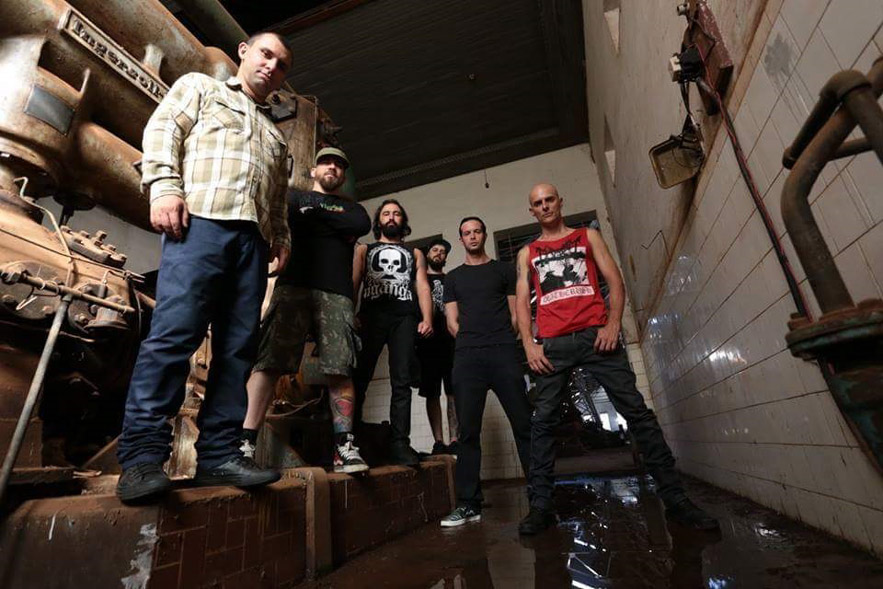
[Manu is on the far right]
9.2. I think we all know or read about the time of the second wave of Black Metal from Scandinavia with bands like MAYHEM, BURZUM, EMPEROR and a few others and about the church burnings, the desecration and destruction of cemeteries, and the murders in the early and mid 90s.
How was the situation in Brazil at that time? Did these events at that time have some kind of influence on the Brazilian Metal scene?
Manu: I think embryonic bands of black metal like Venom, Bathory and Hellhammer were the most influential at that time. I like some bands of the Norwegian scene of the 90s, like Darkthrone, Enslaved and especially Mayhem. I know that today there are several bands in Brazil influenced by that period. Sarcófago is not one of them , and never has been, for sure.
9.3. Considering that the burnings and murders were carried out by people who were still young back then, can you remember what you thought back then and what do you think of it today?
Manu: I think that's something stupid. On the one hand I have many criticisms of Catholicism. I repudiate the blood shed in the name of Christ ($) since ancient times. What has it brought positive for metal, to Norway, to the world? I do not know. I do not support this kind of violent action.
10. We don’t need to kid ourselves, extreme Metal has changed in a lot of ways. In the 80s and even in the early 90s, it was not always so easy to acquire this kind of music, which made it more fascinating at the time. On the other hand, these days that kind of music is recognized and accepted in public, in society, and in the media and everyone can listen to and play extreme Metal like Black, Death or Thrash Metal music and even form a band without having any ability, or even any particular passion or knowledge. I don’t like to say it's all bad nowadays, for we can't stop neither time nor process, even as far as the Metal scene is concerned, but one should still be allowed to mention it and talk about it, as well as give their opinion on it.
What do you think, has Metal music lost meaning for you over the years?
Manu: I will always be in love with heavy metal, and several of its subdivisions. I understand what you say, nowadays things are cooler, many bands are not true with their music and it all sounds pasteurized. Today for many people metal is a business, soulless and heartless. I keep looking for emeralds in the trash (laughs). And I always find them! A new band that caught my attention was "Tau Cross" with members of VoiVod - and Amebix. Much more dangerous than the thousands of bands who only think about playing fast and ultra technical. More of the same…
10.1. What does this kind of music mean to you? Does this form of music exist only to entertain, like all the others, or is it much more than just music for you, and is it even almost a matter of ideology, as far as that goes?
Manu: Metal, as well hardcore/punk, are a source of energy and learning for me. Since I was a kid 30 years ago. It's part of who I am, my essence and will always be with me.
11. Alright, we come to the end of this kind of special interview … Thanks a lot for your interest and for your answers. I wish you all the best for the future … the last words are yours!
Manu: Thank you for your interest and I apologize for the delay (laughs). For those who want to know more about my work in Uganga here's the links:
www.uganga.com.br and https://www.youtube.com/user/ugangamg/videos.
Long live free men! Greetings and respect to everyone!
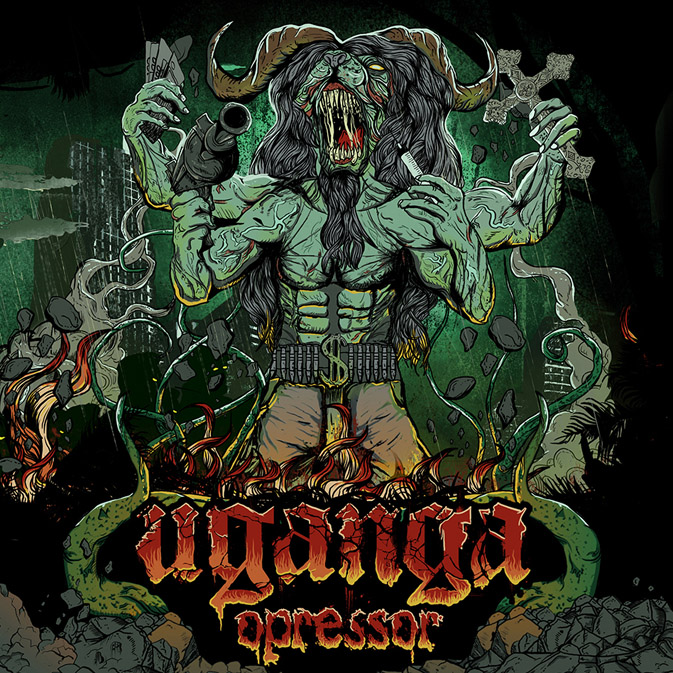
[Opressor - 2014 - Uganga is Swahili for witchcraft; sorcery; magic]
Back to Interviews








